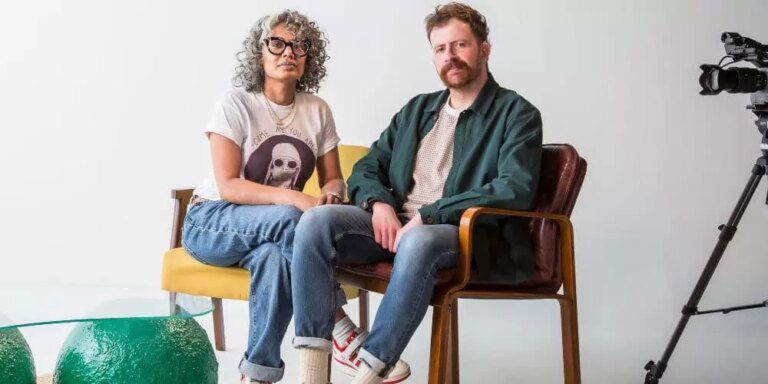This September, UK social enterprise Hear Art will launch “Shaping Tomorrow”, a brand new and unique video podcast featuring deaf people, made with a 90% deaf production team.
Hear Art is an award-winning community interest company co-founded in 2020 by Cindy Sasha and Rachel Shenton, who won an Academy Award for their short film The Silent Child in 2018. Both have hearing loss in their families and wanted to support creative talent within the deaf community.
The company has already produced four short films featuring deaf characters that have had commercial success at short film festivals, and sees podcasting as the next step.
Currently in post-production, the five-episode ‘Shaping Tomorrow’ series uses British Sign Language and is the first deaf-focused video podcast to focus on the journeys of deaf professionals working in the creative, sport and entertainment industries, exploring the challenges they have faced, and still face, along the way.
A range of deaf guests – including actress Sophie Stone, textile artist and co-founder and director of Flare Arts Omeima Mudawi Rawlings MBE, mountaineer Michael Woods, architect Christopher Laing and make-up artist Nikki Weir – will be interviewed by prominent deaf people working in their industries, each sharing their own personal stories within their field of expertise.
Interviewers including actress Maxine Peake, contemporary artist and visual anthropologist Alinka Echeverria, adventurer and solo explorer James Aiken, designer and entrepreneur Wayne Hemingway MBE and make-up artist Caroline Burns share their comparative experiences and explore themes such as resilience, personal growth, accessibility, inclusivity and the pursuit of equality.
Cindy Sasha, CEO and co-founder of Hear Art, who is also the creator and producer of Shaping Tomorrow, said, “Podcasts offer another way to access information and storytelling. We realized that podcasts are only geared towards the hearing experience, so we created an inclusive video podcast where everyone can enjoy and be inspired by Deaf voices and stories.”
“This video podcast uniquely presents the perspectives of two experts per episode – one hearing, one deaf – and sheds light on how deaf people cope and thrive in hard-to-access environments.
“Through their stories, listeners will gain a greater understanding of the challenges the Deaf community faces and the amazing and inspiring ways they overcome them. This video podcast is uniquely Deaf-led and I chose Sam Arnold to direct the series, showcasing his extraordinary talents as a Deaf director.”
Sam Arnold, producer of the recent award-winning film “Name Me Lawand,” commented, “When Cindy approached me about Shaping Tomorrow, I immediately knew this would be a groundbreaking video podcast. Her vision is original and important, as is Cindy's passion and personality. I knew I could come on board and combine my vision with hers to bring Shaping Tomorrow to life.”
“I know that many talented Deaf voices have been ignored or overlooked in all industries, and Cindy and I shared the same vision to create a platform for them.
“As a deaf director, I'm passionate about improving the video podcast experience so that it can be enjoyed by both deaf and hearing audiences. This is especially important for deaf audiences, who are at a disadvantage because they can't access audio-only podcasts and only get to see boring shots of two people talking.”
Actress Maxine Peake said: “It's been one of the most amazing experiences. I've learned so much and am so impressed with the deaf community. We need to be more inclusive, break down barriers and stop overthinking things.”
“The world out there is so brilliant, so rich, so diverse, so colorful, so inspiring. Can we show more of that on stage and on screen? Can we show the world we live in, rather than the monochrome world we sometimes see?”
Hear Art co-founder, actress and author Rachel Shenton said: “The Shaping Tomorrow conversation is incredibly exciting as it's our first standalone initiative. As always, we're committed to encouraging the Deaf and hearing communities to work together and learn from each other, and this conversation is the perfect way to do that.”
Hear Art is committed to improving employment and commercial opportunities for deaf creatives, and aims to have at least 50% of each project's staff be deaf or hard of hearing.


